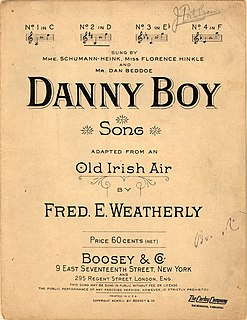
"Danny Boy" is a ballad, written by English songwriter Frederic Weatherly in 1913, and set to the traditional Irish melody of "Londonderry Air".

Sam M. Lewis was an American singer and lyricist.

"Somewhere In France Is the Lily" is a World War I march composed in 1918 by Joseph E. Howard with lyrics written by Philander Chase Johnson. It became a hit twice in 1918, charting when released by Charles Hart and by Henry Burr. The song presents a young couple separated by war but held together by love and the sentimental value of lily flowers.

"A Soldier's Rosary" is a 1918 song composed by Joseph A. Burke with lyrics by J. E. Dempsey. The 1918 publication, by the A. J. Stasny Music Co., featured a cover illustration by E. E. Walton.
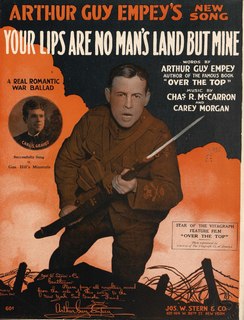
"Your Lips Are No Man's Land But Mine" is a World War I war song. It became a hit in 1918 when released by Henry Burr & Albert Campbell, charting peaking at #2 in the United States.

"They Were All Out of Step But Jim" is an American World War I war song. It rose to popularity in 1918 when released by Billy Murray, charting at #3 in the United States.

"Au Revoir, but not Good Bye: Soldier Boy" is a 1917 song composed by Albert von Tilzer, with lyrics written by Lew Brown.

Baby's Prayer Will Soon Be Answered is a 1918 song written during World War I and performed by Henry Burr. The music and lyrics were written by Billy Baskette and Van & Schenck, and it was published by Shapiro, Bernstein & Co. Based on the sales, it reached an approximate peak position of No.2 on the Top 100 US songs of its time.
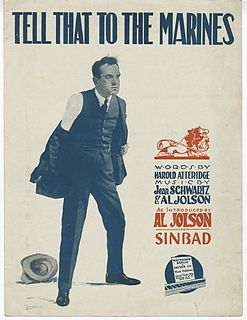
"Tell that to the Marines" is a 1918 song, written during World War I. Jean Schwartz and Al Jolson composed the music; Harold Atteridge wrote the lyrics. Al Jolson performed an early version of the song. Based on sales estimates, it reached number two on the Top 100 US songs of its time.
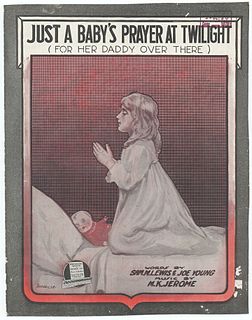
Just a Baby's Prayer at Twilight is a 1918 song composed by M.K. Jerome, with lyrics written by Sam M. Lewis and Joe Young. The song was published by Waterson, Berlin & Snyder Co. The song was performed by Henry Burr and reached number one on the top 100 US songs of 1918. Burr's recording sold a million copies in sheet music and sales.

Oui, Oui, Marie is a 1918 song performed by Arthur Fields. The music was composed by Fred Fisher with lyrics written by Alfred Bryan and Joe McCarthy. It was published by McCarthy & Fisher Inc. The sheet music cover featured an illustration by Andre De Takacs. The song reached a peak position of No.2 on Top 100 US Songs of 1918.
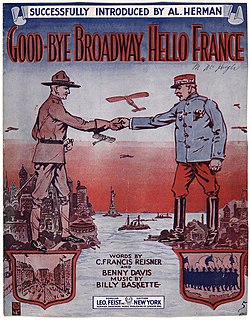
Good-Bye Broadway, Hello France is a 1917 song composed by Billy Baskette, with lyrics written by C. Francis Reisner and Benny Davis. The song was published by Leo Feist, Inc.

"My Belgian Rose" is a 1918 song written by George Benoit, Robert Levenson, and Ted Garton, and published by Leo Feist, Inc. The song was performed by Charles Hart and Ellot Shaw and reached number eight on the top 100 U.S. songs of 1918.

"For Your Boy and My Boy" is a 1918 song composed by Egbert Van Alstyne, with lyrics written by Gus Kahn and published by Jerome H. Remick & Co. The song was performed by Al Jolson and later reached No. 4 on the top 100 US songs of 1918 with a cover by the Peerless Quartet.
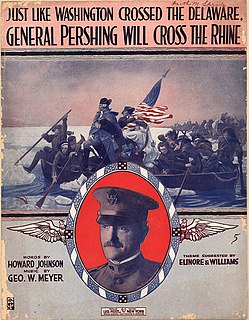
"Just Like Washington Crossed the Delaware, General Pershing Will Cross the Rhine" is a 1918 song composed by George W. Meyer, with lyrics written by Howard Johnson and published by Leo Feist, Inc.

"Bring Back My Soldier Boy to Me" is a World War I era song written by Walter Hirsch and composed by Frank Magine. The song was copyrighted by Al Piantadosi & Co., Inc., New York in 1918.

God Be With Our Boys Tonight is a World War I era song written by Wilfrid Sanderson and Fred G. Bowles in 1918. It reached number three on the US top 100 songs of June 1918.
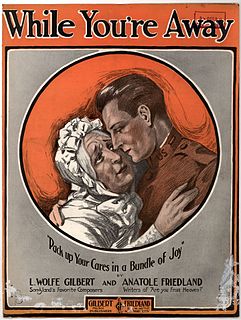
While You're Away is a World War I song released in 1918. L. Wolfe Gilbert and Anatole Friedland composed the music and lyrics. It was published by Gilbert & Friedland Inc. The song was performed by Harry Ellis; and also by The Peerless Quartet. In October 1918, it reached the number five spot on the US song charts. In December 1918, the song reached a peak position of number two on Top 100 US Songs of that year.
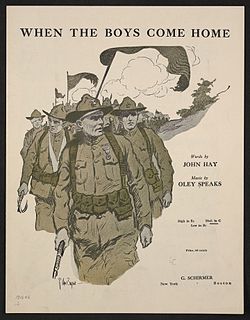
"When the Boys Come Home" is a World War I song. It was first published as sheet music in 1915 with music by Oley Speaks and lyrics by John Hay.
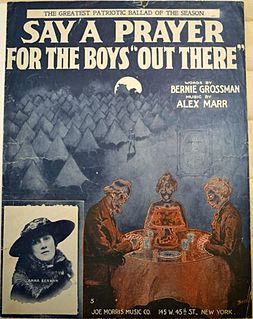
"Say a Prayer for the Boys "Out There"" is a World War I era song released in 1917. Bernie Grossman wrote the lyrics. Alex Marr composed the music. It was published by Joe Morris Music, Co. of New York, New York. The sheet music cover was designed by the Starmer Brothers. It features a family praying at the dinner table. Behind them is a sentry guarding a campground of tents. There is an inset photo on the left side that varies per edition. The song was written for both voice and piano.




















